PPI vs H2 Blocker Comparison Tool
Use this tool to compare PPIs and H2 blockers based on your needs.
If you’re weighing Protonix against other acid‑reducing meds, here’s what you need to know.
Key Takeaways
- Protonix (pantoprazole) is a potent PPI with a long half‑life, making it ideal for chronic GERD.
- Generic pantoprazole offers similar efficacy at a lower cost.
- Alternative PPIs such as Nexium, Prilosec, Prevacid, and Aciphex differ mainly in onset speed, drug‑interaction profile, and price.
- H2 blockers like Pepcid work faster but are less effective for severe acid suppression.
- Choosing the right option depends on cost, insurance coverage, symptom severity, and potential interactions.
What is Protonix?
Protonix is the brand name for pantoprazole, a proton pump inhibitor (PPI) that blocks the final step of acid production in the stomach lining. It’s FDA‑approved for gastroesophageal reflux disease (GERD), erosive esophagitis, and Zollinger‑Ellison syndrome. Typical dosing is 40mg once daily, taken before a meal. Because it has a relatively slow onset (about 3hours) but a long duration (up to 24hours), it’s often preferred for maintenance therapy rather than immediate relief.
Major Alternatives to Protonix
Below are the most common prescription‑level acid reducers you’ll encounter.
Esomeprazole (brand name Nexium) is a PPI that offers a slightly faster onset than pantoprazole and is marketed for severe GERD and Barrett’s esophagus.
Omeprazole (brand name Prilosec) was the first PPI on the market; it’s widely available as both prescription and over‑the‑counter, making it a cost‑effective option for many patients.
Lansoprazole (brand name Prevacid) provides a quick onset and is often used when rapid symptom control is needed.
Rabeprazole (brand name Aciphex) has a high bioavailability and is less affected by genetic variations in CYP2C19, which can be a factor for some patients.
Generic pantoprazole contains the same active ingredient as Protonix but is sold at a lower price point, offering identical efficacy.
Famotidine (brand name Pepcid) belongs to the H2‑blocker class; it works faster than PPIs but provides weaker overall acid suppression.
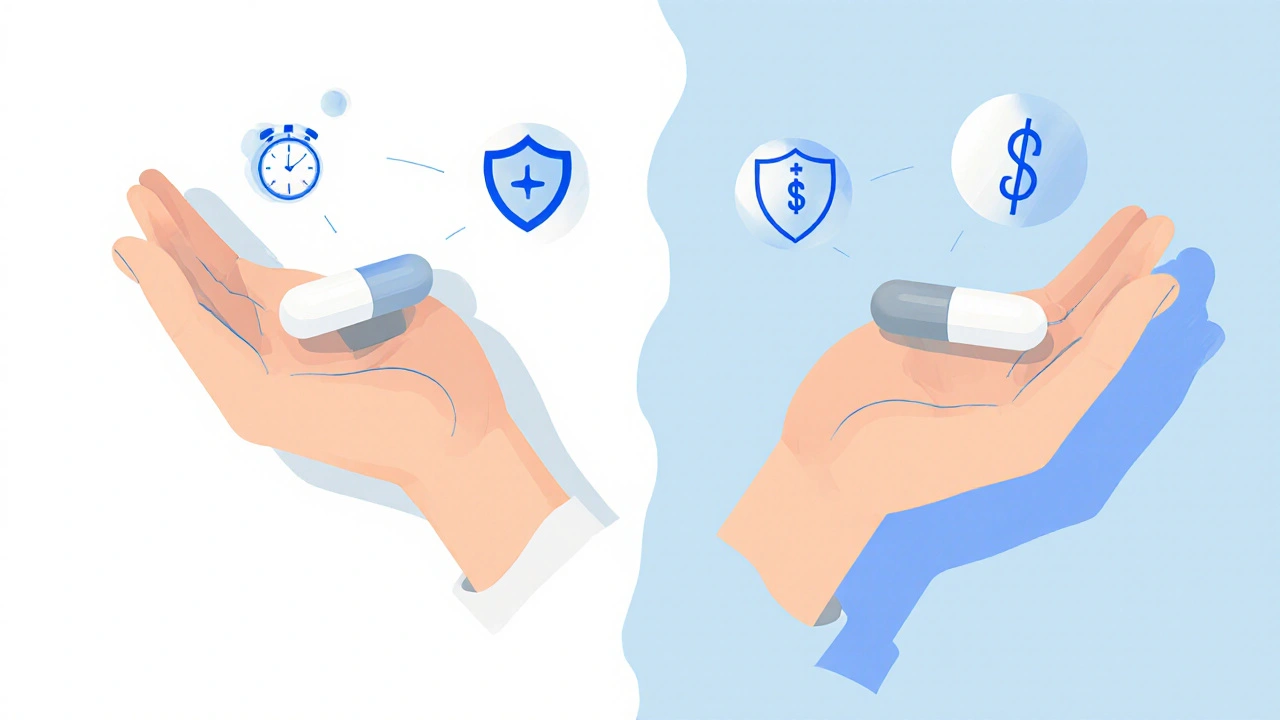
Side‑Effect Profiles
All PPIs share a core set of potential side effects-headache, diarrhea, and abdominal pain. Long‑term use (beyond 6 months) has been linked to diminished calcium absorption (increasing fracture risk) and a slight rise in Clostridioides difficile infection. Among the alternatives, H2 blockers like Famotidine rarely cause nutrient malabsorption but may trigger rebound acid hypersecretion when stopped abruptly.
Cost Considerations (2025 US Retail Prices)
Pricing can vary widely based on insurance and pharmacy contracts. Approximate average retail prices for a 30‑day supply are:
| Brand | Generic Name | Typical Dose | Average Retail Cost (USD) | Onset (hrs) | Half‑Life (hrs) |
|---|---|---|---|---|---|
| Protonix | Pantoprazole | 40mg QD | $120 | 3 | 1.5 |
| Generic Pantoprazole | Pantoprazole | 40mg QD | $30 | 3 | 1.5 |
| Nexium | Esomeprazole | 40mg QD | $150 | 2 | 1.3 |
| Prilosec | Omeprazole | 20mg BID | $40 (OTC) | 3 | 1 |
| Prevacid | Lansoprazole | 30mg QD | $85 | 2.5 | 1.4 |
| Aciphex | Rabeprazole | 20mg QD | $70 | 2 | 1 |
| Pepcid | Famotidine | 20mg BID | $25 | 0.5 | 2.5 |
How to Choose the Right Acid Reducer
Think of the decision like picking a tool for a job. If you need long‑lasting suppression for chronic GERD, a PPI such as Protonix or generic pantoprazole is usually best. If you only need occasional relief-like after a heavy meal-an H2 blocker like Famotidine may be sufficient and cheaper.
Key factors to weigh:
- Severity of symptoms: Moderate‑to‑severe reflux often requires a PPI.
- Cost and insurance coverage: Generic pantoprazole and OTC omeprazole can shave hundreds off the bill.
- Drug‑interaction risk: PPIs inhibit CYP2C19; patients on clopidogrel may need an alternative such as famotidine.
- Need for rapid relief: H2 blockers act within 30‑60 minutes, while PPIs need several days to reach full effect.
- Long‑term safety: Consider bone‑health monitoring if you anticipate >1year of PPI use.
Talk with your healthcare provider about your specific situation. They can check for hidden interactions (e.g., with certain antifungals or HIV meds) and help you decide whether the brand name Protonix, its generic, or a different PPI fits your needs.
Frequently Asked Questions
Can I switch from Protonix to generic pantoprazole?
Yes. Both contain the same active ingredient, so efficacy and safety are identical. Most insurers favor the generic, which can reduce out‑of‑pocket costs dramatically.
Is Nexium stronger than Protonix?
Nexium (esomeprazole) and Protonix have comparable acid‑suppression potency. Nexium may work a bit faster in some patients, but the difference is usually modest.
Do PPIs cause weight gain?
Weight changes are not a direct side effect of PPIs. However, symptom relief can improve appetite, which might lead to slight weight gain in some individuals.
Can I take a PPI and an H2 blocker at the same time?
Yes, some doctors prescribe a PPI for baseline control and add an H2 blocker at bedtime for extra nighttime relief. This combo can be useful for refractory night‑time reflux.
How long is it safe to stay on Protonix?
Short‑term (up to 8weeks) use is well‑studied. For chronic conditions, doctors may continue PPIs for years but will monitor bone density, magnesium levels, and kidney function.

Next Steps
1. Review your insurance formulary to see which PPIs are covered.
2. Make a list of any other prescription or over‑the‑counter meds you take; check for CYP2C19 interactions.
3. Schedule a brief appointment with your primary‑care physician or gastroenterologist to discuss symptom severity and whether a brand name, generic, or alternative PPI (or even an H2 blocker) is the right fit.
4. If cost is a primary concern, ask about a 90‑day supply of generic pantoprazole; many pharmacies offer a discount card that can lower the price further.
By weighing efficacy, price, and safety, you’ll land on the acid‑reducer that best matches your lifestyle and health goals.

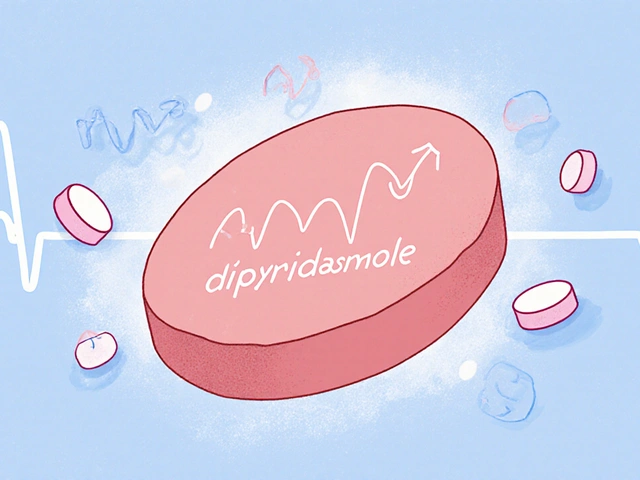

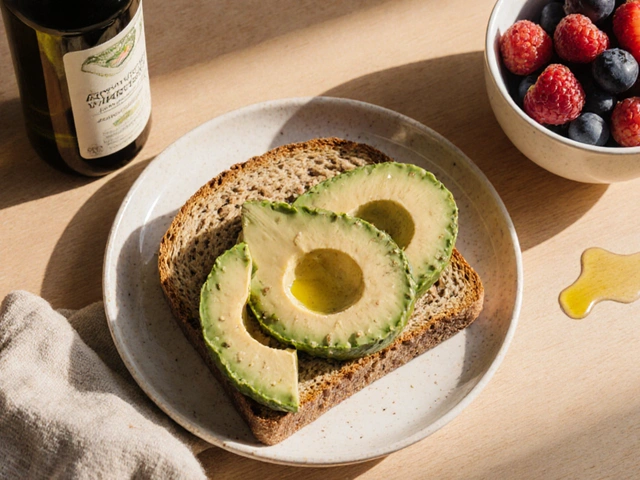
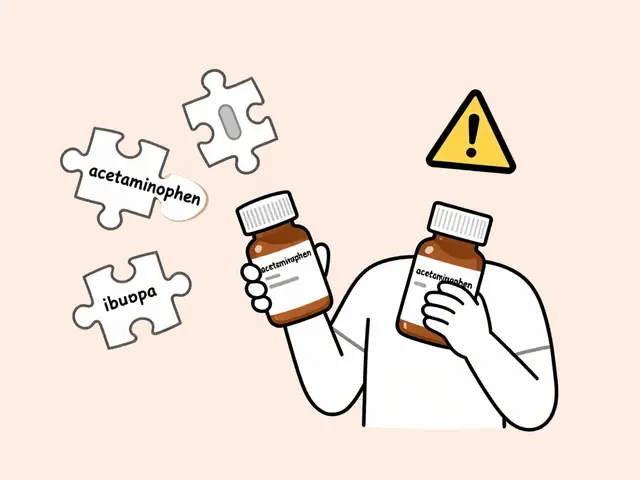
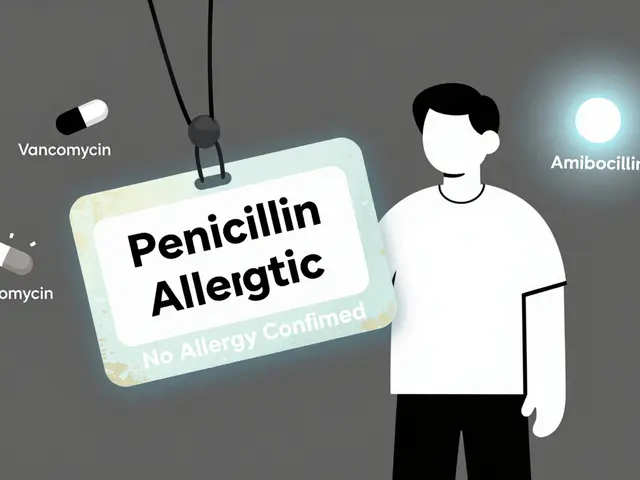
16 Comments
Hey folks, just wanted to say that this guide does a solid job breaking down the options – it’s like having a friendly pharmacist on standby. If you’re on a budget, the generic pantoprazole really shines, and for those who need that extra punch, Nexium’s a good backup. Keep an eye on your insurance formulary, because a small switch can save you big bucks. And of course, always loop your doctor in when you’re juggling multiple meds.
Great rundown! I like how the table lays out onset times side‑by‑side – makes it easy to match the medication to your daily routine. If you have moderate reflux and need something that kicks in quickly, the Prevacid data point is worth a look. For anyone juggling insurance, remember to check if they require prior authorization for the brand‑name PPIs.
Protonix is pricey but works.
One must appreciate the comprehensive nature of this comparison; it elegantly balances clinical detail with layperson accessibility. The inclusion of both pharmacokinetic parameters and cost analysis is commendable. However, one could argue that the discussion on long‑term safety could be expanded to include recent meta‑analyses on renal outcomes. Moreover, the interplay between CYP2C19 polymorphisms and PPI efficacy deserves a dedicated subsection, especially for clinicians tailoring therapy. 😊
Reading through this makes me think of the countless patients who feel overwhelmed by the jargon. It’s refreshing to see the side‑by‑side cost table – that visual cue really helps demystify the options. For anyone hesitant about switching to a generic, remember that the active ingredient is identical; the only real difference is the price tag. If you have any lingering doubts, a quick chat with your pharmacist can clear them up faster than scrolling through forums.
Interesting data but nobody mentions the hidden agenda in pharma trials. The big brands push the narrative of superiority while the generics quietly steal the show. Also, the whole "cost concern" filter seems to ignore the fact that insurance rebates are a secret game.
Oh please, the drama of “brand versus generic” is overblown. Everyone knows the only real winner is the one that actually stops the heartburn, not the label on the bottle. If you keep buying that fancy name because it feels premium, you’re just feeding the hype machine. Let’s be real, the science doesn’t care about your brand loyalty.
Yo, this tool is legit! I was confused about whether to pop a Pepcid for fast relief or wait for a PPI to kick in. The quick‑hit chart saved me from a night of coughing up lava. Also, the cost breakdown is pure gold for students on a shoestring budget.
It is a curious thing how we, as consumers of modern medicine, often find ourselves at the crossroads of efficacy, cost, and convenience.
When evaluating proton pump inhibitors versus H2 blockers, one must first acknowledge the pharmacodynamic distinction: PPIs inhibit the final step of acid secretion, whereas H2 blockers act upstream on histamine receptors.
Consequently, the onset of action diverges markedly, a nuance that becomes clinically relevant in acute versus chronic scenarios.
Take, for instance, a patient with nocturnal reflux; a rapid‑acting H2 blocker can quell symptoms within an hour, yet fails to maintain suppression through the night, prompting the addition of a PPI for sustained control.
On the other hand, chronic GERD sufferers benefit from the prolonged acid suppression offered by PPIs, albeit at the expense of a delayed therapeutic window of several days to achieve maximal effect.
Cost considerations further complicate the decision matrix. Brand‑name PPIs, such as Nexium, command premium pricing, often exceeding $150 for a month’s supply, while their generic counterparts can reduce the financial burden by a factor of four.
The insurance formulary landscape adds another layer, as many plans incentivize generic utilization through tiered co‑pay structures.
Yet beyond price tags, long‑term safety profiles cannot be ignored; chronic PPI therapy has been linked, albeit modestly, to nutrient malabsorption and altered gut microbiota, raising concerns about bone health and infection risk.
Conversely, H2 blockers like famotidine present a markedly lower risk of such systemic effects, though they may precipitate rebound hyperacidity upon abrupt discontinuation.
Drug‑interaction potential is another arena where differentiation is key. PPIs are notorious CYP2C19 inhibitors, potentially diminishing the efficacy of clopidogrel, a crucial antiplatelet agent for many cardiovascular patients.
In contrast, H2 blockers generally exhibit a more benign interaction profile, making them favorable adjuncts in polypharmacy contexts.
Thus, the optimal strategy often resides in a personalized hybrid approach: a baseline PPI for maintenance, complemented by an H2 blocker for breakthrough episodes.
This tandem regimen capitalizes on the strengths of each class while mitigating their respective weaknesses.
Patient education remains paramount; individuals must be apprised of the expected timelines for symptom relief, the importance of adherence, and the necessity of periodic monitoring for adverse effects.
In summary, the choice between Protonix and its alternatives is not a binary decision but a nuanced algorithm that weighs severity, urgency, economic factors, and safety considerations.
Employing tools like the interactive comparison chart empowers patients and clinicians alike to navigate this complex terrain with greater confidence.
Listen up: if you’re serious about your gut health, stop chasing brand names. Grab the generic pantoprazole, check your magnesium levels, and demand a bone density scan after a year. No one should let a pharmaceutical company dictate your dosage without accountability.
Yo, that’s the spirit! Switch to the generic, hit up your doc for labs, and keep that wallet happy. You’ve got this – stay motivated!
Excellent synthesis; concise, precise, and well‑structured. The inclusion of both pharmacoeconomic and pharmacokinetic data provides a holistic view. Well done.
Great job! I really appreciate the friendly tone and the thoroughness. Even with a few typos, the info shines through. Keep it up!
Thank you for this detailed breakdown; the table format is particularly useful for quick reference, and the discussion of drug interactions is thorough.
I commend the authors for presenting the data so clearly. It is essential that patients have access to transparent cost comparisons, especially when navigating insurance formularies.
Awesome guide! The colorful tables make the numbers pop, and the friendly tone kept me reading all the way through. Thanks for making a complicated topic easy to digest.